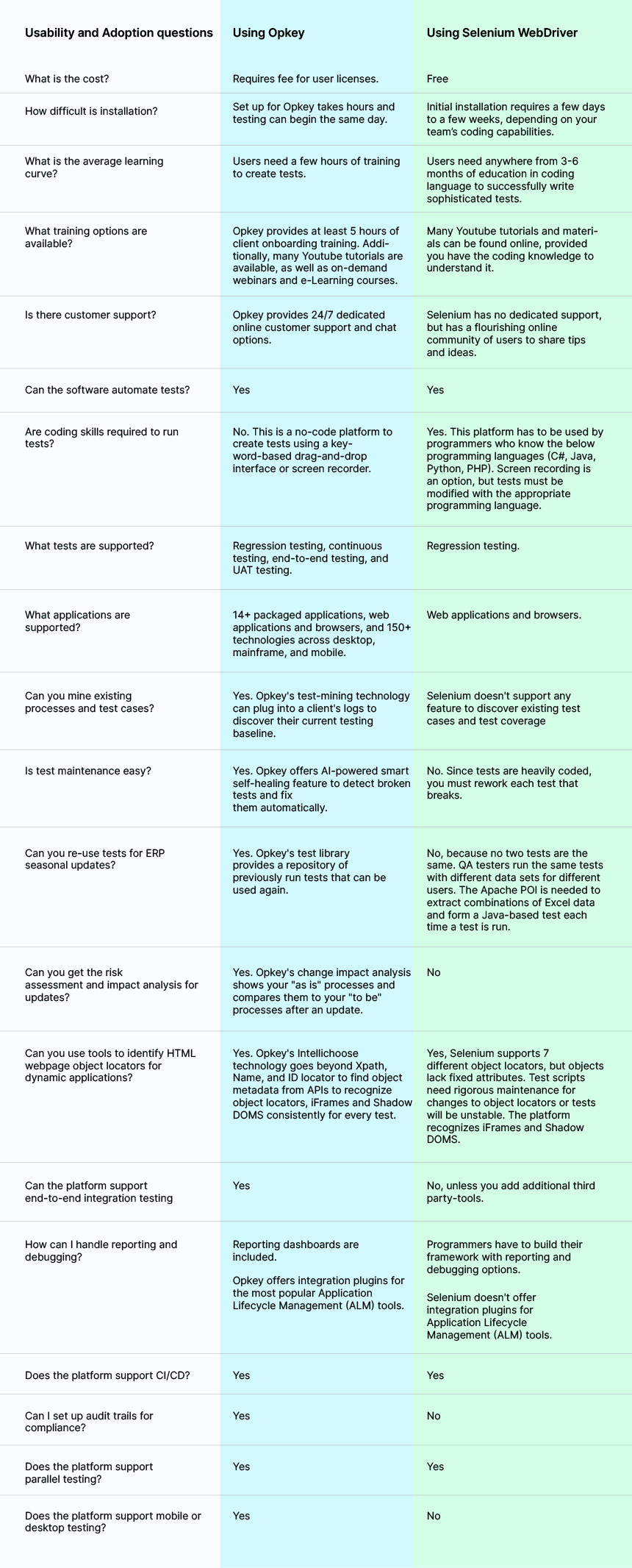Introduction: An Evolving Landscape
In this accelerating age of rapid ERP transformation, test automation is no longer a question of why?
It’s a question of how?
How can we avoid bottlenecks during updates and migrations? How can we maintain tests with constantly changing applications? How can we scale test automation to increase coverage, without ballooning our budget?
Business and IT leaders across the globe are asking these questions. We at Opkey are answering.
Let’s compare Opkey to a household name in test automation: Selenium WebDriver. This is one of the most recognized tools in the landscape. Developed by Jason Huggins in 2004, the tool took off after merging with WebDriver in 2009. It is estimated that developers and test engineers across 50,000+ organizations use Selenium WebDriver to cover many automated testing needs, including regression testing.
Enter Opkey, the industry’s leading No-Code test automation platform, accessible to any employee, regardless of their technical expertise. Our out-of-the-box technology is an intuitive, no-code automated testing platform for businesses across industries. While Selenium requires an IT-literate coder, Opkey’s automation saves enterprises time and money because of our drag-and-drop interface, library of pre-built tests, and test accelerator.
Switching to Opkey yields our clients an average of 10X ROI and an average reduction of 90% in time-spent-testing.
We are often asked how Opkey compares to Selenium, or if Selenium users really need Opkey. We are not degrading WebDriver. In fact, our team is inspired by Selenium WebDriver and what it has done for the testing community. It was a key stepping stone in the evolution of testing. However, times have changed. The technology is grown, and being good at your job, as well as having an edge over your competitors, depends on your understanding of the issues.
The following information compares Selenium WebDriver and Opkey so you can make the best choice for your enterprise. Let’s get started.
Key Features of Selenium
Selenium is an open-source test automation tool that allows APIs to automate the tests carried out in web browsers. Any action can be performed, such as click, set text, etc., by writing a piece of code. It also provides different options to write code. For example, a user can write a code in Java, Python, C#, Ruby, JavaScript, etc.
Let’s look at some benefits of Selenium:
- Selenium is an open-source tool; there is no licensing cost involved.
- It allows test cases to be written in different programming languages like Java, Python, C#, PHP, Ruby,Perl,l & .Net.
- Tests can be carried out in Windows, Mac, or Linux.
- Support for all major browsers including Mozilla Firefox, Internet Explorer, Google Chrome, Safari, or Opera.
- Features can integrate with tools such as TestNG & JUnit for managing test cases and generating reports.
- Integrations with Maven, Jenkins & Docker can achieve continuous testing.
- It allows users to run parallel executions with cloud providers like SauceLabs and BrowserStack.
Selenium is frequently the first pick for any organization looking to automate testing because it is open-source (free). This leads them to hire engineers who are good at programming and have years of experience writing reusable and maintainable code.
Another benefit of Opkey over Selenium: Opkey has a record and playback engine that records each step from your screen.
One more issue with Selenium is that the coding becomes unmaintainable as it grows. When a new member joins the team, they must learn about the scripts from the coders who wrote them—a long and difficult process. Scripts cannot easily be duplicated or shared, meaning enterprises become overly reliant on the people who wrote them.
Opkey has pre-built accelerators for 12+ of the most popular enterprise applications. Selenium can accomplish these tasks, but with much more effort. We have customers calling weekly, complaining that “I don’t have time to build Selenium tests” and “I’m being yelled at for these tests taking us over timeline.” After using our product, those comments shift to “I finally have time to work on actual value-adding projects” and “updates aren’t so stressful anymore.”
Read our whitepaper: Opkey Vs Selenium, to explore more key differentiators
Key Features of Opkey
How do we do it?
- Pre-Built Accelerators– Opkey comes with 30,0000+ pre-built test assets across Oracle, SAP, Salesforce, and more. These accelerators allow users to quickly build test cases in seconds—there’s no need to code or build from scratch.
- Impact Analysis and Self-Healing– If you have worked with applications like Oracle, Salesforce, or MS Dynamics, you know how difficult it is to maintain test cases after an update. Opkey solves this issue by instantly detecting and identifying the changes between old and new versions of these applications and highlights the impacted test cases. You can then self-heal (auto-heal) the scripts with a button click.
- Self-Configuring Tests– Opkey’s technology can read the backend configurations of applications like Oracle and Salesforce to create required sets of positive and negative data for tests. This saves the time that Selenium users typically spend creating and maintaining data for test cases.
- Image-Based and Text-Based Object Identification– Opkey provides built-in keywords, which can find objects simply by providing a snapshot or text. Although this can be performed through Selenium with third-party integrations, it requires an extensive set of programming skills.
- Test Discovery- Opkey’s patent-pending test mining technology discovers relevant business processes and then focuses testing on the most important ones. This prevents enterprises from spending numerous hours on business-process discovery sessions and guarantees that your organization’s continuous testing program has the best test coverage. Selenium provides no such feature for users.
- White-Glove Customer Service- Opkey experts are on-hand to walk you through any questions you may have and keep you up to date on advisories and changes.
Comparing Selenium and Opkey
https://youtube.com/watch?v=3NR0cKLEESk%3Fenablejsapi%3D1%26origin%3Dhttps%3A
The above video is a live demonstration of automating a web application test case using two platforms: Opkey and Selenium.
By comparing the two platforms, you quickly see how much easier and simpler it is to create a robust, automated test with Opkey. For Opkey, it’s simple: a user mimics his day-to-day workflows, and important test data, keywords, and object properties are all automatically captured. This entire process is takes just minutes. With Selenium, the same process takes hours, and the user must know how to code. Moreover, the code becomes unmaintainable as it grows. When a new member joins the team, they must learn about the scripts from the coders who wrote them—a long and difficult process. Scripts cannot easily be duplicated or shared, meaning enterprises become overly reliant on the people who wrote them.
While businesses are initially drawn to Selenium because it’s an open-source and free tool, they end up paying more money because of labor and delays. No-code platforms like Opkey provide far more cost & time savings in the long run. They’re also easier to use.
In today’s world, IT leaders simply don’t have time to make the wrong choice. The health of their companies depends on them. Make a choice that benefits the morale of your team, the sanctity of your budget, the sanity of your employees, and the speed of your timeline.








